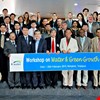


Water insecurity costs the global economy some US$ 500 billion annually, according to Global Water Partnership (GWP). That figure does not take into account environmental impacts so the total drag on the world economy could be 1% or more of global Gross Domestic Product (GDP).

What: Launch of GWP/OECD report “Securing Water, Sustaining Growth” and Policy Statement
When: Monday 13 April, 17:00-19:00 Korea Standard Time
Where: World Water Forum, Korea – Daegu EXCO, DEC_502, 5F Auditorium

SRI is as a set crop management practices for raising the productivity of irrigated rice by changing the management of plants, soil, water and nutrients. One of the important treatments of SRI is that standing water is not essential anymore instead the soil is kept just fairly wet and thus creating aerobic-anaerobic conditions during the cultivation period. This treatment gives distinct behaviors of water regimes allowing more proliferation of roots and the most important is capable to enhance the activities of soil micro-organisms.

Under Water and Climate Development Programme (WACDEP), Myanmar WACDEP activity title is Development of the National Water Policy and Water Law with Integrating Water Security and Climate Resilience Aspects into Investment Planning and Decision making Process. Its goal is to point out the integration of water security and climate resilience aspects to be included in the national water policy and water law. With aiming the goal of the activity, the works have been initiated with making two assessment studies, such as, Assessment of the National Water Policy of Myanmar (NWPM) and Assessment of the Current Situation of Water Security and Climate Resilience Aspects in Myanmar. After that identification of these aspects to be integrated in NWPM, how to implement the integration process by means of consultative meeting which will be held among multi-stakeholders from water sector. Finally selecting and prioritizing the action plans for integrating water security and climate resilience aspects into the NWPM.


"Delivering Solutions"
The 3rd workshop of the Capacity Building Programme “The Economics of Adaptation, Water Security and Climate Resilient Development” took place in the framework of the Water, Climate, Development Program for Africa (WACDEP), in Hammamet, Tunisia, on December 22-25, 2014. The Programme is composed of a series of five workshop trainings that are following the framework cycle developed under WACDEP for water security and climate resilience.


The Global Water Partnership-Caribbean (GWP-C) has embarked on a new initiative under its Water, Climate and Development Programme (WACDEP) called “Climate-Proofing Water Investment in the Caribbean” which is being executed in partnership with the Caribbean Community Climate Change Centre (CCCCC).